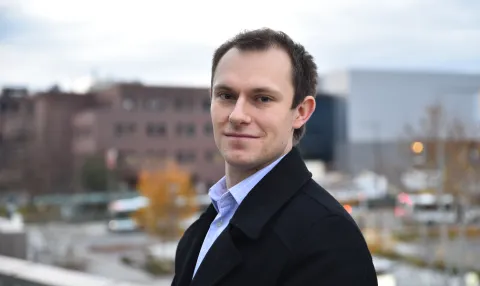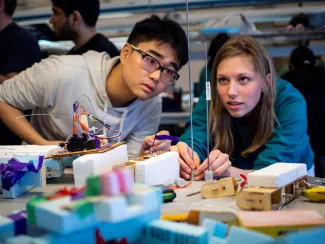"During my education, I have found that curiosity has been an excellent driver for my inspiration."

Bryn Crawford
- Degree:
- Doctor of Philosophy
- Grad year: 2020
- Program:
- Campus: Okanagan
I am a PhD candidate in the mechanical engineering program at UBC’s School of Engineering. I started my journey as an engineer when I first enrolled in my Bachelor’s of Aerospace and Mechanical Engineering at Adelaide University in 2007, followed by a Masters of Mechanical Engineering in 2011. Currently, I am completing my thesis-based program, focusing on combining artificial intelligence topics with advanced composites manufacturing to improve productivity.
Prior to starting my PhD in 2016, I worked as a Research Engineer at the Composites Research Network for four years, which was my first experience within the UBC community. I also started taking up Sessional Instructor and Lecturer positions during this time, exposing myself directly to the student community. After having been introduced to the many exciting opportunities available at UBC, and when the chance to pursue further education here arose, I was compelled to choose this path.
During my time as a student at UBC, I have been able to participate in a range of activities and experiences that have been highly rewarding. This includes serving as VP of Finance and Risk Management for the Western Engineering Competition 2016, being the Member-at-Large on the Engineering Graduate Student Society in 2017/2018, being an Organizing Committee member and Presenter of the 4th Annual Graduate Engineering Symposium in 2018, graduating from the inaugural e@UBC entrepreneurship program in 2019 and more.
Based on my personal experiences throughout this journey, I can vouch that UBC is an incredible institution that has provided me with numerous opportunities. I have, and will continue to, greatly value the outstanding community at UBC.
Why did you choose to go into your field of study at UBC?
From a young age, I have always been drawn to mathematics and science, out of a curiosity for the natural world. I pursued these topics early in my education, and over time, I grew a great appreciation for how such knowledge can be used to make positive impacts across society. This only further motivated me to develop a career in this area, ultimately culminating in the decision to pursue engineering. Ever since then, I have not looked back and have found this career path to be immensely rewarding. Having been a part of UBC as a member of staff for over four years, the transition to student life was a great fit.
What has made your time at UBC memorable?
The most memorable feature of my time at the School of Engineering is bearing witness to the consistent and deep teamwork between the student, staff and faculty bodies on an ongoing basis. The School is one of the largest departments at the Okanagan campus and this is in part attributed to the hard work and teamwork of all involved, with so many achievements being made every day. Further, having the opportunity to be a part of the School has made a strong impression on me, which I have carried through my time studying and will continue to far into my future career.
What has been your most valuable non-academic experience studying at UBC?
With such a dynamic student body in the Okanagan, I found that being a member of the Engineering Graduate Student Society (EGSS) was a great way to learn more about the community, get involved and contribute. For example, helping coordinate free barbeque events for students was always rewarding and mingling with smiling faces and having great discussions with people from all corners of the world was as well, especially at the beginning of a new semester. Similarly, helping organize and participating in the 4th Annual Graduate Engineering Symposium helped me understand both the breadth and depth of research being undertaken at the School, as well as connect directly with others who share my research interests. While volunteering with the EGSS, I also served as a representative on the Graduate Student Advisory Council, acting as a voice for the engineering student community and interacting with the decision-making processes that directly affect the student experience.
Tell us about your experience in your program. What have you learned that is most valuable?
Amongst the myriad of opportunities for growth and skill development, I found that one of the most rewarding experiences during my program was to spend three months at the Royal Melbourne Institute of Technology (RMIT) in Melbourne, Australia. This was supported by the Queen Elizabeth II Diamond Jubilee Scholarship awarded by the School of Engineering. The experience allowed me to work closely with experts in modeling and machine learning topics, integrating it into my own process engineer research. In the spirit of teamwork and mentorship, this was not only immensely valuable during my time at RMIT but has continued to be in the form of long-term collaborations.
How are you applying the skills you learned through your studies at UBC?
The skills I’ve developed during my time at UBC have allowed me to make positive contributions to a range of research and applied projects. Most of these are technical in nature, such as developing machine learning-based process models to help make local Canadian manufacturers more globally competitive. However, I have found that the most rewarding examples involve a combination of the technical and soft skills that I have learned. For example, between 2016-2019 I was the project manager for the Personal Belongings Carrier, primarily leading the mechanical design work for the novel initiative to assist homeless communities as a collaboration between UBC, the City of Kelowna and other crucial partners. This exposed me to issues and solutions in the wider community, helping me learn how I can make positive impacts beyond a laboratory or teaching setting.
What advice would you give a student entering your degree program?
The experience of being a graduate student can be immensely rewarding, especially given the opportunities offered through the UBC community. Ensuring that you have a good support network will go a long way in helping you realize such an outcome. This includes family, friends, peers, colleagues and your academic supervisors. A strong foundation in these areas will help facilitate freedoms in pursuing contributions to campus life, teaching opportunities and other non-academic initiatives, which all help in making the time in one’s program even more memorable.
How do you feel your degree has benefitted you compared to a different field of study?
While having not had the benefit of formally studying other fields to make such a direct comparison, my exposure to various programs across many universities has shown me many benefits of studying my program at the School of Engineering. Given how young, dynamic and hard-working the faculty are, as a student, I have been granted access to many cutting-edge industrial projects and brand-new infrastructure to significantly augment my learning journey. Such comparable advantages have certainly contributed towards the overall quality of my experience in my program.
Where do you find your inspiration?
During my education, I have found that curiosity has been an excellent driver for my inspiration. This is especially the case when tackling abstract concepts such as artificial intelligence. The curiosity around mathematics in general, the concept of learning and indeed how they can be expressed together, has helped develop this inspiration. Those around me, most of all my supervisor, have also helped instill this within me.
What are your immediate and/or long-term plans for the future?
My immediate plans for the future are to work towards completing my program, specifically to graduate in 2020. From there, I am hoping to remain working in the intersection of manufacturing and machine learning, contributing to the wider Canadian production community.
What are your future plans to make a difference in our world?
The power of machine learning has been, and will continue to be, truly transformative to modern society. I hope to continue being a part of these efforts in bringing about long-term and positive change, leveraging the skills that I have developed at my time at UBC. I also hope to never stop learning and sharing knowledge with others towards a common goal of prosperity!



